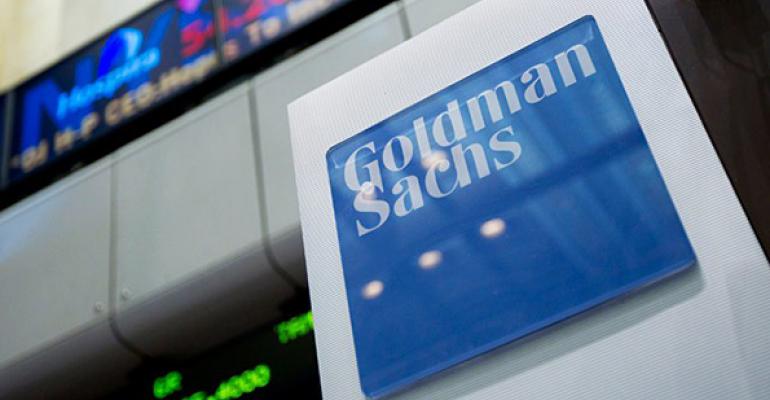NEW YORK (Reuters) - Goldman Sachs Group Inc is pulling back substantially from trading that helps backstop the fast-growing use of U.S. exchange-traded funds, giving smaller firms an opportunity to grab market share.
Goldman has told fund providers it is scaling back its role as a top lead market maker (LMM) for ETFs and has already slashed the number of funds it supports in that capacity, according to disclosures, fund managers and other trading firms this month.
Relatively high regulatory and other costs of operating as an LMM prompted the pullback by Goldman, one of the few large banks remaining in that role, some people said.
A spokeswoman for Goldman declined to comment on the bank's market-making business.
The move signals the shifting landscape of making markets in many assets away from traditional broker-dealers towards smaller, electronic-focused upstarts.
LMMs are critical to keeping ETFs trading smoothly. While brokers-dealers can typically trade as they please, firms acting as LMMs must consistently offer competitive buy-and-sell quotes in their assigned ETFs, and they receive rebates on exchange fees. Some also provide start-up financing for the funds.
The LMMs risk some of their own capital to buy and sell ETFs to help maintain their liquidity. Unlike smaller rivals, big banks like Goldman Sachs are subject to strict capital requirements by regulators, putting them at a disadvantage when it comes to costs in an already low-margin business.
ETFs attracted a record $348 billion globally in the first half of this year, compared to $123 billion at the same point last year, according to research service ETFGI LLP.
Despite the skyrocketing growth in ETFs, it can be hard to translate the LMM business into a high-margin operation.
Market making is a technology business as much as a trading enterprise, and involves finding the right price for funds holding dozens of stocks or bonds in a split second while making other trades to manage risk.
One industry veteran described the business as "scraping fractions of pennies all day."
Goldman continues to make issuing its own ETFs through its asset management unit a priority, however, even as it steps back from providing the infrastructure to keep such funds trading.
Bowing Out
Since last year, the number of ETFs backed by Goldman as a LMM on Intercontinental Exchange Inc's NYSE Arca trading venue has plunged to 178 from 380, according to documents published by NYSE.
Goldman is no longer the lead market maker on major ETFs including the $78 billion iShares MSCI EAFE ETF, $14 billion Guggenheim S&P 500 Equal Weight ETF and $8 billion WisdomTree Japan Hedged Equity Fund, according to NYSE data.
NYSE Arca is the largest exchange for ETFs by number of listings. Other exchanges offer similar programs to encourage market making.
Bill Belden, head of ETF business development for Guggenheim Investments, said Goldman is no longer lead market maker on several of their ETFs as of last month, "as they have largely stepped out of the LMM business."
Goldman continues to be a force in ETF trading even as it withdraws from LMM assignments at exchanges. It held a 9 percent market share for U.S. ETF trading at the end of the second quarter, up about 20 percent over the same period last year, according to exchange traded volume from NYSE Arca and Nasdaq.
Stepping in
One of Goldman's competitors, speaking on condition of anonymity, said the bank had "a very attractive book of assignments," adding that "there is high demand for [exchange-traded products] that Goldman is dropping."
Lesser-known but deeply experienced trading firms, including New York-based Jane Street Group LLC and a subsidiary of Amsterdam-based IMC BV, have picked up some of Goldman's former LMM assignments, NYSE data shows.
Despite Goldman's exit, some bank-owned trading operations see value in the business, such as RBC Capital Markets, part of Royal Bank of Canada, which has stepped into new LMM roles.
Douglas Yones, NYSE's head of ETFs, said that while some of its liquidity providers "have narrowed their presence, it has opened the door for many more firms to enter the marketplace with positive results."
Goldman reported overall trading revenue of $3.1 billion during the second quarter, a drop of 17 percent from the year ago period and the worst start to a year since Chief Executive Lloyd Blankfein took the helm of the bank.
The bank's once-massive LMM franchise was partly the inheritance of its $6.5 billion acquisition in September 2000 of Spear Leeds & Kellogg LP, which served as lead for the first U.S.-listed ETF, the SPDR S&P 500, in the early 1990s.
In 2014, Goldman wrote down the value of the market making operations, including its ETF lead market making rights, and signaled a broader change in its strategy when it sold some related trading operations to IMC.
Reporting by Trevor Hunnicutt; Additional reporting by Olivia Oran and John McCrank; Editing by Jennifer Ablan and Meredith Mazzilli


